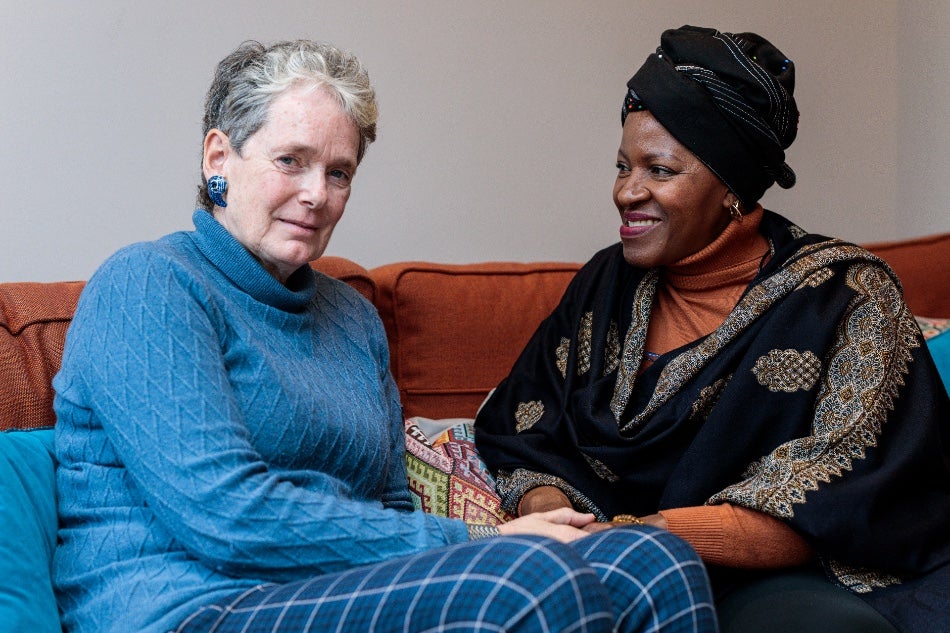Top-level official Gerard de Graaf works in Silicon Valley on behalf of the European Union, in order to ensure that major tech companies comply with European digital rules. „Technological innovation? Perhaps something could also be done about the homeless people lying on the doorstep of the Twitter headquarters."
He speaks to VU Magazine from San Francisco by video link, at quite an unsociably early hour of the morning. „No problem. I’ve had to get up really early the last few weeks anyway, to watch the Dutch team play their World Cup matches."
You studied Social Geography at the VU Amsterdam in the 1980s. Why did you choose this subject?
„In high school, I was fascinated by geography. Because my father had a flower farm, we never went abroad for our holidays. Geography became a sort of virtual travel for me, enabling me to visit all kinds of countries without physically moving. Studying social geography was a good follow-up to that."
„I still remember the first time I walked into the lecture theatre, and the professor sternly saying to us: ‘Take a good look at the person to your left and to your right. Only one of you three will be here next year.’ That shocked me into realising that I really had to do my best, and that just showing up wouldn’t be enough."
What did you think of the course?
„I thought it was top quality. It wasn’t just about geography, it was also a course in academic thinking. It taught me how to be a structured thinker, and I’m very grateful to the professors for this. The things I learned were very broad in terms of content, about everything ranging from social geography to the origins of mountains, and we also touched on the study of sociology and anthropology."
„If they start calling you an expert in something, then you have to make sure you move on to something else."
„I have continued this approach in my career. I’m a generalist rather than a specialist. It’s common for people within the European commission to switch policy areas every three years. If they start calling you an expert in something, then you have to make sure you move on to something else. Up till now, I’ve switched from public procurement to financial services and then to trade policy and digital policy. You have to be able to switch easily to other fields and adopt interdisciplinary thinking. My studies laid good foundations for this."
What fascinates you about the digital field?
„Around 2004, I recognised that it would become an important policy area. I have always been motivated to work in areas that are socially relevant and where things are happening. If I were a car, I would probably only have a fifth gear and a parking mode. Previously, ‘digital’ was seen as a sector associated with telecommunications. Now ‘digital’ is relevant to all of society. This raises so many issues. For example, consider the major platforms: how are we going to make sure that the Internet is safe, and that those platforms don't dominate the market too much? What position will we take with respect to China?"
„There is also a lot happening geopolitically. When countries like Kenya or Senegal start making decisions about how they want to regulate the Internet, which policies will they adopt? Those of China, Russia or Turkey too, to some extent? Or will they opt for the European, human rights-based policy?"
„Chinese people are required to watch the speeches made by their great leaders, while cameras track their eye movements to see whether they are actually watching and reading along with the speeches."
What are your thoughts on digital policy in China?
„China’s approach is authoritarian and repressive. They are using social media as a surveillance tool to monitor people. So much so that Chinese people are required to watch the speeches made by their great leaders, while cameras track their eye movements to see whether they are actually watching and reading along with the speeches. This flies in the face of the freedom we envision in Europe."
You have been in Silicon Valley for several months now, helping to introduce European policy to the tech giants there. What kind of discussions are you having?
„First of all, don't get me wrong: the digital world brings a lot of positive things and is an important part of our lives. I’m sometimes quite shocked by the notification I receive on Monday mornings, summarising how much time I have spent on my iPhone. However, we should not disregard the dangers and disadvantages. There is a lot of illegal content online, such as child pornography (in which the Netherlands is unfortunately the leader), calls for hatred and violence, and misinformation. The Internet has the capacity to disrupt society. Examples include Brexit, antivaxxers, and the misinformation spread by Russia after the invasion of Ukraine, such as blaming Europe for the famine in Africa due to the blockading of grain ships."
„I’m sometimes quite shocked by the notification I receive on Monday mornings, summarising how much time I have spent on my iPhone."
„Governments have to set clear rules about these matters, and platforms have to recognise their own responsibilities. Big tech companies such as Google, Meta, Apple, Amazon, Twitter and many more are located here. They have to start complying with European legislation to ensure that the Internet is safe, their services cannot be misused for illegal content, and their ‘walled gardens’ are opened up to enable more effective competition from other companies. These are far-reaching measures that will strike at the core of large companies and involve hundreds of billions of dollars."
Not a pleasant message for them. How are they responding?
„They are being surprisingly agreeable. If you want to do business in Europe, then you have to follow the rules in Europe. Similarly, if Europeans want to sell drugs in America, they must also have them tested by the FDA (Federal Drugs Administration). Europe is an important market for these platforms, so they don’t have much choice. If I were them, I would also be agreeable."
„The US is a great country if you’re rich, but not so much if you are not."
Doesn't it conflict with the American dream, and the idea that the government shouldn’t interfere too much in these matters?
„That is starting to change. The US is a great country if you’re rich, but not so much if you are not. Every American walks around thinking: what will I do if I lose my job tomorrow? There is no social safety net there, and you can’t underestimate the psychological effect of that on people. This chronic uncertainty to which the average American is exposed is the birthplace of political unrest. Platforms are increasingly being held responsible for divisions and polarisation in society. There are more and stronger calls here to deal with this. America itself is incapable of taking action – it’s far too divided for that. This means there’s no chance America will simply follow our lead, so it’s up to us, as Europe, to do the hard work."
What has surprised you the most in San Francisco?
„The thing that has struck me the most is that companies are thinking even less about the impact of technology on society than I expected. That impact can be enormous. Profound change is needed, starting from the way engineers and other technicians are trained. If you teach technology, you must also teach ethics and incorporate the social dimension. After all, technology is being used in society. Just as a doctor takes the Hippocratic Oath, students of technology courses at Stanford or Berkeley should also have to adhere to the concept of ‘first, do no harm’."
„Perhaps something could also be done about the tens of thousands of homeless people in San Francisco, who are almost literally lying on the doorsteps of Big Tech companies such as Twitter."
„I hear people everywhere here passionately saying that they want to change the world with things like blockchain technology, crypto, metaverse, you name it. At the same time, however, rents here are going through the roof, supermarkets are at least three times as expensive as in the Netherlands, and if you don't earn a large salary, you might as well forget about living here at all. Sometimes I think about all this emphasis on technological innovation and getting rich quick, and then I think: perhaps something could also be done about the tens of thousands of homeless people in San Francisco, who are almost literally lying on the doorsteps of Big Tech companies such as Twitter. Europeans would not be able to ignore that. When I’m in the US, I feel much more like a European than I do when I’m actually in Europe."








